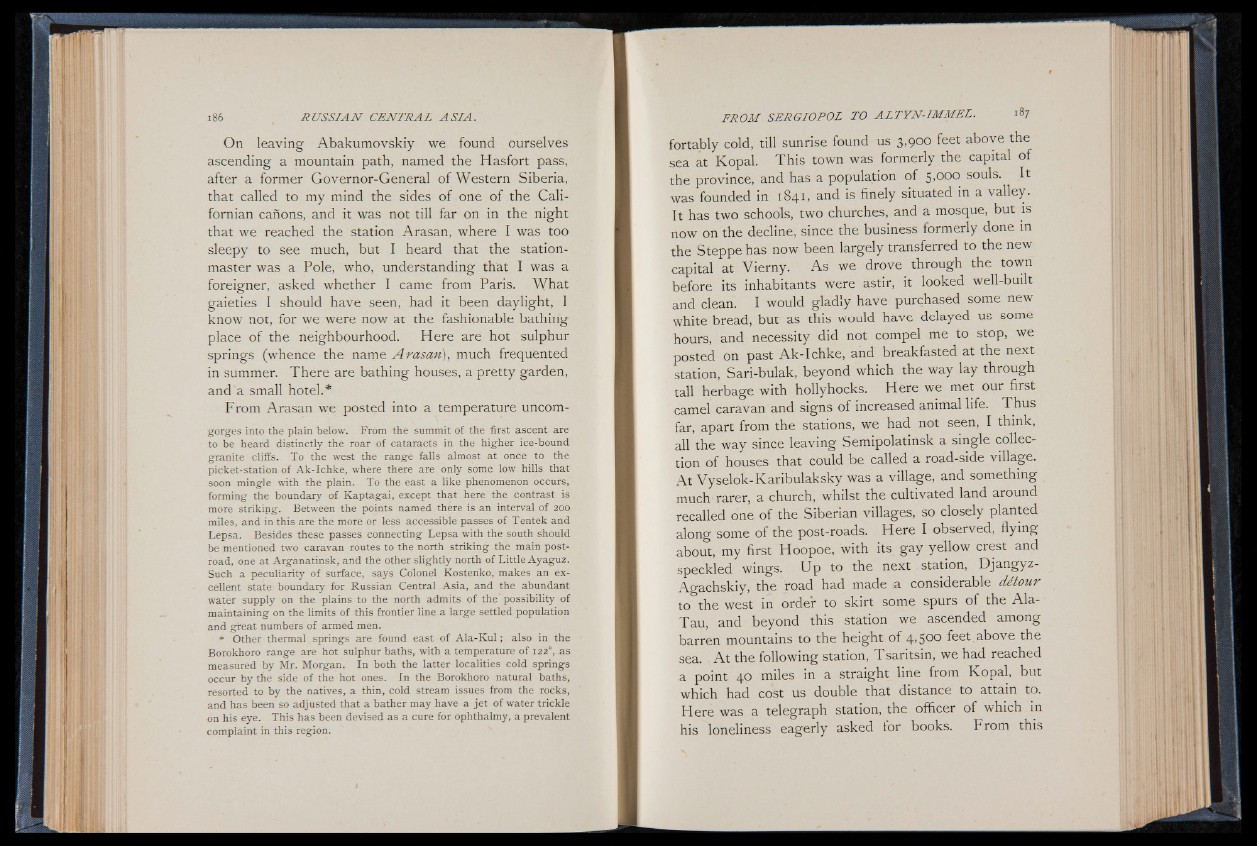
On leaving Abakumovskiy we found ourselves
ascending a mountain path, named the Hasfort pass,
after a former Governor-General of Western Siberia,
that called to my mind the sides of one of the Californian
canons, and it was not till far on in the night
that we reached the station Arasan, where I was too
sleepy to see much, but I heard that the station-
master was a Pole, who, understanding that I was a
foreigner, asked whether I came from Paris. What
gaieties I should have seen, had it been daylight, I
know not, for we were now at the fashionable bathing
place of the neighbourhood. Here are hot sulphur
springs (whence the name Arasan), much frequented
in summer. There are bathing houses, a pretty garden,
and a small hotel.*
From Arasan we posted into a temperature uncomgorges
into the plain below. From the summit of the first ascent are
to be heard distinctly the roar of cataracts in the higher ice-bound
granite cliffs. To the west the range falls almost at once to the
picket-station of Ak-Ichke, where there are only some low hills that
soon mingle with the plain. To the east a like phenomenon occurs,
forming the boundary of Kaptagai, except that here the contrast is
more striking. Between the points named there is an interval of 200
miles, and in this are the more or less accessible passes of Tentek and
Lepsa. Besides these passes connecting Lepsa with the south should
be mentioned two caravan routes to the north striking the main postroad,
one at Arganatinsk, and the other slightly north of Little Ayaguz.
Such a peculiarity of surface, says Colonel Kostenko, makes an excellent
state boundary for Russian Central Asia, and the abundant
water supply on the plains to the north admits of the' possibility of
maintaining on the limits of this frontier line a large settled population
and great numbers of armed men.
* Other thermal springs are found east of A la -K u l; also in the
Borokhoro range are hot sulphur baths, with a temperature of 122°, as
measured by Mr. Morgan. In both the latter localities cold springs
occur by tlie side of the hot ones. In the Borokhoro natural baths,
resorted to by the natives, a thin, cold stream issues from the rocks,
and has been so adjusted that a bather may have a je t of water trickle
on his eye. This has been devised as a cure for ophthalmy, a prevalent
complaint in this region.
fortably cold, till sunrise found us 3,900 feet above the
sea at Kopal. This town was formerly the capital of
the province, and has a population of 5,000 souls. It
was founded in 1841, and is finely situated in a valley.
It has two schools, two churches, and a mosque, but is
now on the decline, since the business formerly done in
the Steppe has now been largely transferred to the new
capital at Vierny. As we drove through the town
before its inhabitants were astir, it looked well-built
and clean. I would gladly have purchased some new
white bread, but as this would have delayed us some
hours, and necessity did not compel me to stop, we
posted on past Ak-Ichke, and breakfasted at the next
station, Sari-bulak, beyond which the way lay through
tall herbage with hollyhocks. Here we met our first
camel caravan and signs of increased animal life. Thus
far, apart from the stations, we had not seen, I think,
all the way since leaving Semipolatinsk a single collection
of houses that could be called a road-side village.
A t Vyselok- Karibulaksky was a village, and something
much rarer, a church, whilst the cultivated land around
recalled one of the Siberian villages, so closely planted
along some of the post-roads. Here I observed, flying
about, my first Hoopoe, with its gay yellow crest and
speckled wings. Up to the next station, Djangyz-
Agachskiy, the road had made a considerable ddtour
to the west in order to skirt some spurs of the Ala-
Tau, and beyond this station we ascended among
barren mountains to the height of 4>5°° feet above the
sea. A t the following station, Tsaritsin, we had reached
a point 40 miles in a straight line from Kopal, but
which had cost us double that distance to attain to.
Here was a telegraph station, the officer of which in
his loneliness eagerly asked lor books. From this